Nissan Juke vs Fiat 500 – Differences & prices compared
Compare performance, boot space, consumption and price in one view.
Find out now: which car is the better choice for you – Nissan Juke or Fiat 500?
The Nissan Juke (SUV) comes with a Petrol or Full Hybrid engine and Manuel or Automatic transmission. In comparison, the Fiat 500 (Hatchback) features a Electric engine with Automatic transmission.
When it comes to boot capacity, the Nissan Juke offers 422 L, while the Fiat 500 provides 185 L – depending on how much space you need. If you’re looking for more power, decide whether the 143 HP of the Nissan Juke or the 118 HP of the Fiat 500 suits your needs better.
In terms of consumption, the values are 4.70 L per 100 km for the Nissan Juke, and 13 kWh for the Fiat 500.
Price-wise, the Nissan Juke starts at 21400 £, while the Fiat 500 is available from 25300 £. Compare all the details and find out which model fits your lifestyle best!
Nissan Juke
The Nissan Juke stands out with its distinctive design and bold styling, making it a popular choice for those seeking something different on the road. Its interior cleverly combines modern technology with comfort, offering an enjoyable driving experience for both the driver and passengers. Despite its compact size, the Juke provides a surprising amount of space and versatility, making it suitable for urban adventures and weekend getaways alike.
details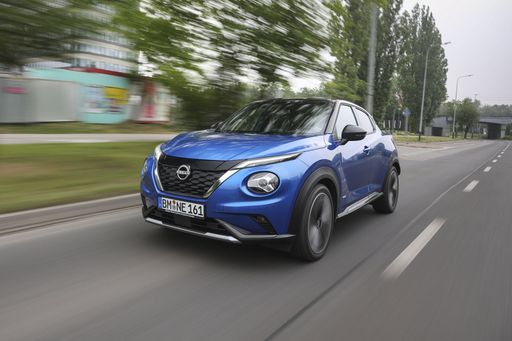 @ germany.nissannews.com
@ germany.nissannews.com
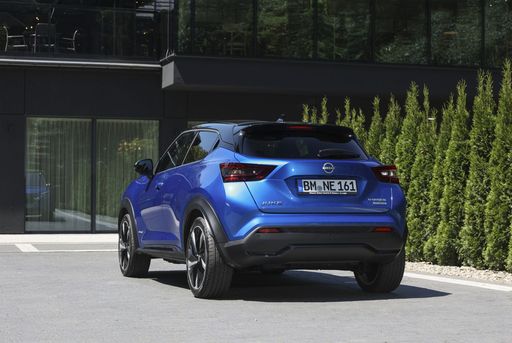 @ germany.nissannews.com
@ germany.nissannews.com
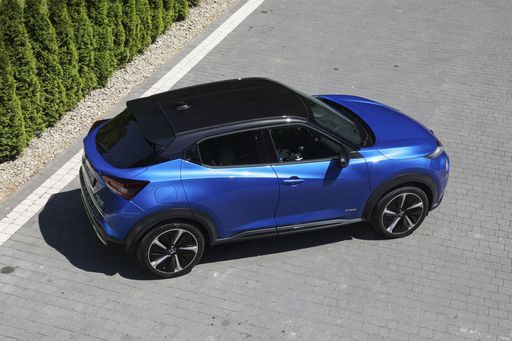 @ germany.nissannews.com
@ germany.nissannews.com
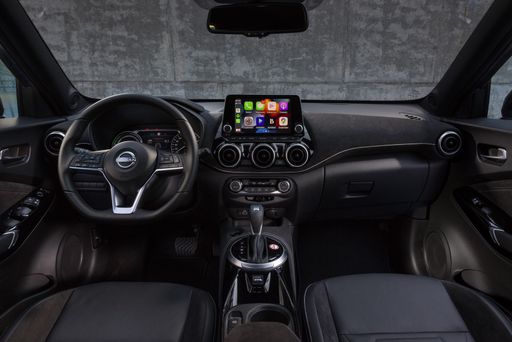 @ germany.nissannews.com
@ germany.nissannews.com
Fiat 500
The Fiat 500 is a compact and stylish city car that has captured the hearts of urban drivers with its charming retro design. Its nimble handling and efficient engine make navigating tight city streets a breeze, while its cosy interior offers a surprising amount of comfort and modern technology. The car's iconic silhouette and vibrant colour options ensure it stands out, offering a unique blend of timeless appeal and contemporary flair.
details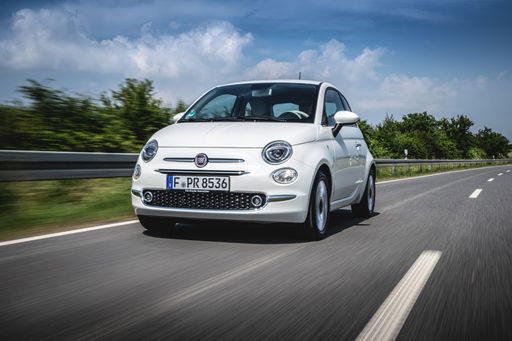 @ media.stellantis.com
@ media.stellantis.com
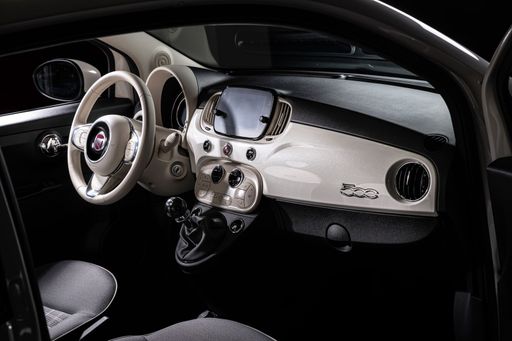 @ media.stellantis.com
@ media.stellantis.com
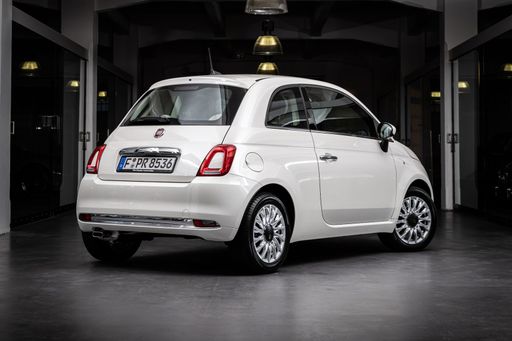 @ media.stellantis.com
@ media.stellantis.com

|

|
|
|
|
Costs and Consumption |
|
|---|---|
|
Price
21400 - 30100 £
|
Price
25300 - 35600 £
|
|
Consumption L/100km
4.7 - 6 L
|
Consumption L/100km
-
|
|
Consumption kWh/100km
-
|
Consumption kWh/100km
13 - 14.7 kWh
|
|
Electric Range
-
|
Electric Range
190 - 321 km
|
|
Battery Capacity
0.60 kWh
|
Battery Capacity
21.3 - 37.3 kWh
|
|
co2
107 - 136 g/km
|
co2
0 g/km
|
|
Fuel tank capacity
46 L
|
Fuel tank capacity
-
|
Dimensions and Body |
|
|---|---|
|
Body Type
SUV
|
Body Type
Hatchback
|
|
Seats
5
|
Seats
4
|
|
Doors
5
|
Doors
3 - 4
|
|
Curb weight
1274 - 1405 kg
|
Curb weight
1330 - 1475 kg
|
|
Trunk capacity
354 - 422 L
|
Trunk capacity
185 L
|
|
Length
4210 mm
|
Length
3632 mm
|
|
Width
1800 mm
|
Width
1683 mm
|
|
Height
1593 mm
|
Height
1527 mm
|
|
Payload
405 - 427 kg
|
Payload
250 - 305 kg
|
Engine and Performance |
|
|---|---|
|
Engine Type
Petrol, Full Hybrid
|
Engine Type
Electric
|
|
Transmission
Manuel, Automatic
|
Transmission
Automatic
|
|
Transmission Detail
Manual Gearbox, Dual-Clutch Automatic, Automatic Gearbox
|
Transmission Detail
-
|
|
Drive Type
Front-Wheel Drive
|
Drive Type
Front-Wheel Drive
|
|
Power HP
114 - 143 HP
|
Power HP
95 - 118 HP
|
|
Acceleration 0-100km/h
10.1 - 11.8 s
|
Acceleration 0-100km/h
9 - 9.5 s
|
|
Max Speed
166 - 180 km/h
|
Max Speed
135 - 150 km/h
|
|
Torque
200 Nm
|
Torque
220 Nm
|
|
Number of Cylinders
3 - 4
|
Number of Cylinders
-
|
|
Power kW
84 - 105 kW
|
Power kW
70 - 87 kW
|
|
Engine capacity
999 - 1598 cm3
|
Engine capacity
-
|
General |
|
|---|---|
|
Model Year
2024
|
Model Year
2023 - 2025
|
|
CO2 Efficiency Class
D, E, C
|
CO2 Efficiency Class
A
|
|
Brand
Nissan
|
Brand
Fiat
|
Nissan Juke
Introduction to the Nissan Juke: A Compact SUV with Style
The Nissan Juke has always been a standout in the compact SUV segment, renowned for its bold design and impressive versatility. As we look at the 2024 model year, Nissan continues to innovate, offering a range of options that cater to both practicality and driving pleasure.
Performance and Efficiency: Under the Bonnet of the Nissan Juke
The 2024 Nissan Juke comes with a variety of engine choices tailored to suit different driving needs. With power outputs ranging from 114 to 143 PS, these engines strike a balance between performance and efficiency. The petrol options are equipped with a 1.0-litre three-cylinder engine that generates 114 PS, providing a sprightly drive perfect for urban environments. Meanwhile, the 1.6-litre hybrid version offers 143 PS, combining electric and petrol power for a more eco-friendly performance.
Fuel consumption varies between 4.7 and 6 L/100km, highlighting the Juke's commitment to efficiency. With CO2 emissions ranging from 107 to 137 g/km, the Nissan Juke offers an environmentally conscious choice for drivers seeking to reduce their carbon footprint.
Driving Technology and Innovation
Innovation is at the heart of the Nissan Juke, with cutting-edge technology designed to enhance the driving experience. The hybrid variants use a unique full-hybrid system, incorporating a small 0.6 kWh battery to provide seamless power assistance during acceleration. This system not only improves efficiency but also supports a smooth, responsive driving experience.
The Juke's manual gearboxes and various automatic transmission options, including the efficient dual-clutch transmission, ensure that drivers can choose the driving style that best suits their preferences. Front-wheel drive remains standard across the range, delivering dependable and predictable handling characteristics.
Design and Comfort: More Than Just Looks
The Juke's exterior is daringly distinctive, with a design that combines angular lines and a high-riding stance to create a sporty yet practical profile. The dimensions of 4,210 mm in length, 1,800 mm in width, and 1,593 mm in height, combined with its 5-door configuration, ensure ample space and accessibility for passengers and luggage alike.
Inside, the Nissan Juke accommodates up to five passengers with comfort and style. A boot capacity ranging from 354 to 422 litres provides adequate space for everyday life or weekend getaways. The various trim levels, including Acenta and Tekna, are equipped with premium features and technology to keep occupants entertained and comfortable.
Safety Features and Driver Assistance
Nissan has equipped the Juke with an array of safety features that provide peace of mind on the road. The Juke includes standard and optional technologies such as adaptive cruise control, lane-keeping assist, and emergency braking systems, enhancing both driver confidence and passenger safety.
With CO2 efficiency classes ranging from C to E, the Nissan Juke not only delivers advanced safety but also meets modern environmental standards.
Conclusion: A Balanced Compact SUV
The 2024 Nissan Juke stands out as a compelling choice in the compact SUV market. With its combination of eye-catching design, innovative technology, and efficient performance, the Juke continues to attract drivers looking for a unique vehicle that doesn’t compromise on practicality or driving pleasure. Whether in the city or on the open road, the Juke delivers a driving experience that is both thrilling and responsible.
Fiat 500
The Timeless Charm: Introducing the Fiat 500
The Fiat 500 has long been a symbol of Italian style and urban practicality. As we navigate a new era in automotive history, the Fiat 500 continues to adapt and remains a much-loved vehicle worldwide. Let’s delve into the latest technical details and innovations that make this car a modern classic.
Electric Heartbeat: The Engines and Performance
The latest Fiat 500 models are powered entirely by electricity, showcasing a commitment to sustainable mobility without sacrificing performance. Under the stylish bonnet lies a choice between two power outputs, starting from a lively 70 kW (95 PS) to an energetic 87 kW (118 PS). This range of electric motors ensures that whether you’re navigating narrow city streets or cruising along open roads, the Fiat 500 delivers engaging performance with zero emissions.
Efficiency Meets Innovation: Energy Consumption and Range
Efficiency is at the forefront of the Fiat 500’s design. With energy consumption figures as low as 13 to 14.7 kWh/100km, the car balances power and performance efficiently. Electric range varies across the models, from 190 km for those designed for short urban commutes to an impressive 321 km for longer journeys. The innovative lithium-ion battery options—spanning 23.8 kWh to 42 kWh—are neatly integrated to maintain the car’s compact dimensions.
Technological Marvel: Smart Features and Design
The Fiat 500 is adorned with advanced features that enhance convenience and safety. It comes with an intuitive infotainment system that includes smartphone connectivity, navigation, and various driver assistance technologies, ensuring a seamless driving experience. The “La Prima” equipment line offers premium materials and a luxurious feel inside the cabin, making every journey comfortable and enjoyable.
Urban Flexibility: Compact Dimensions and Practicality
Designed for urban environments, the Fiat 500’s dimensions make it ideally suited for city dwellers. With a length of 3632 mm, width of 1683 mm, and height of 1527 mm, it’s easy to navigate through traffic and park in tight spaces. Despite its compact size, the Fiat 500 provides a practical boot capacity of 185 litres, perfect for daily errands or a weekend getaway.
Commitment to the Environment: Sustainability Focus
The Fiat 500 exemplifies a dedication to eco-friendliness with its CO2 emissions at zero, earning it an A in CO2 efficiency class. By choosing this vehicle, drivers are contributing towards a future with reduced automotive pollution, supporting cleaner air and healthier urban living.
Conclusion: The Future of Urban Driving
The Fiat 500 perfectly blends timeless style with modern electric innovations, setting a precedent for future city cars. Whether you prioritise aesthetic design, sustainable driving, or a premium driving experience, the Fiat 500 is designed to exceed expectations and redefine urban transportation.
The prices and data displayed are estimates based on German list prices and may vary by country. This information is not legally binding.
